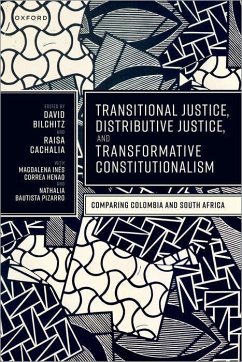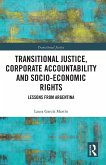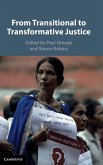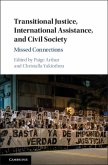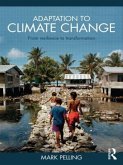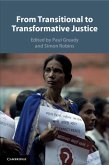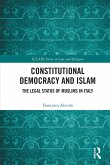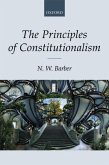Transitional Justice, Distributive Justice, and Transformative Constitutionalism
Comparing Colombia and South Africa
Herausgeber: Bilchitz, David; Cachalia, Raisa
Transitional Justice, Distributive Justice, and Transformative Constitutionalism
Comparing Colombia and South Africa
Herausgeber: Bilchitz, David; Cachalia, Raisa
- Gebundenes Buch
- Merkliste
- Auf die Merkliste
- Bewerten Bewerten
- Teilen
- Produkt teilen
- Produkterinnerung
- Produkterinnerung
This volume offers the first dedicated scholarly comparison of Colombia and South Africa in relation to the intersecting ideas of transitional justice, distributive justice, and transformative constitutionalism.
Andere Kunden interessierten sich auch für
![Transitional Justice, Corporate Accountability and Socio-Economic Rights Transitional Justice, Corporate Accountability and Socio-Economic Rights]() Laura García MartínTransitional Justice, Corporate Accountability and Socio-Economic Rights47,99 €
Laura García MartínTransitional Justice, Corporate Accountability and Socio-Economic Rights47,99 €![From Transitional to Transformative Justice From Transitional to Transformative Justice]() From Transitional to Transformative Justice129,99 €
From Transitional to Transformative Justice129,99 €![Transitional Justice, International Assistance, and Civil Society Transitional Justice, International Assistance, and Civil Society]() Transitional Justice, International Assistance, and Civil Society116,99 €
Transitional Justice, International Assistance, and Civil Society116,99 €![Adaptation to Climate Change Adaptation to Climate Change]() Mark PellingAdaptation to Climate Change50,99 €
Mark PellingAdaptation to Climate Change50,99 €![From Transitional to Transformative Justice From Transitional to Transformative Justice]() From Transitional to Transformative Justice38,99 €
From Transitional to Transformative Justice38,99 €![Constitutional Democracy and Islam Constitutional Democracy and Islam]() Francesco AlicinoConstitutional Democracy and Islam42,99 €
Francesco AlicinoConstitutional Democracy and Islam42,99 €![Principles of Constitutionalism Principles of Constitutionalism]() N. W. Barber (Professor of Constitutional Law and Trinity C TheoryPrinciples of Constitutionalism122,99 €
N. W. Barber (Professor of Constitutional Law and Trinity C TheoryPrinciples of Constitutionalism122,99 €-
-
-
This volume offers the first dedicated scholarly comparison of Colombia and South Africa in relation to the intersecting ideas of transitional justice, distributive justice, and transformative constitutionalism.
Produktdetails
- Produktdetails
- Verlag: Oxford University Press
- Seitenzahl: 512
- Erscheinungstermin: 21. März 2024
- Englisch
- Abmessung: 229mm x 163mm x 53mm
- Gewicht: 998g
- ISBN-13: 9780192887627
- ISBN-10: 0192887629
- Artikelnr.: 69191182
- Herstellerkennzeichnung
- Libri GmbH
- Europaallee 1
- 36244 Bad Hersfeld
- gpsr@libri.de
- Verlag: Oxford University Press
- Seitenzahl: 512
- Erscheinungstermin: 21. März 2024
- Englisch
- Abmessung: 229mm x 163mm x 53mm
- Gewicht: 998g
- ISBN-13: 9780192887627
- ISBN-10: 0192887629
- Artikelnr.: 69191182
- Herstellerkennzeichnung
- Libri GmbH
- Europaallee 1
- 36244 Bad Hersfeld
- gpsr@libri.de
David Bilchitz is Professor of Fundamental Rights and Constitutional Law at the University of Johannesburg and Professor of Law at the University of Reading. He is also Director of the South African Institute for Advanced Constitutional, Public, Human Rights and International Law (SAIFAC). He is a member of the Academy of Sciences of South Africa and Vice-President of the International Association of Constitutional Law. In 2017, he was awarded a Georg Forster research fellowship from the Von Humboldt Foundation. He publishes widely on constitutional law and fundamental rights including his latest monograph Fundamental Rights and the Legal Obligations of Business (2022). Raisa Cachalia is an LLD Candidate at the University of Stellenbosch and a Research Associate in the Faculty of Law at the University of Johannesburg. Her research interests include administrative law and constitutional law. She is an editor at the Constitutional Court Review, a journal dedicated to the judgments of South Africa's highest court.
* 1: David Bilchitz and Raisa Cachalia: Developing a Conceptual
Framework for Global South Comparisons: Colombian and South African
Contributions
* PART I: INNOVATIVE WAYS OF CONCEIVING AND IMPLEMENTING TRANSITIONAL
JUSTICE
* Theme 1: Re-Conceiving Reconciliation as Relationships: the Role of
African and Latin American Values
* 2: Thaddeus Metz: The Role of Economic Goods in National
Reconciliation: Evaluating South Africa and Colombia
* 3: Nathalia Elena Bautista Pizarro: Building Peace and Restoring Law
upon the Ethos: A Comparison between South Africa and Colombia
* 4: Thaddeus Metz and Nathalia Elena Bautista Pizarro: Joint
Reflection - Economic Goods and Communitarian Values
* Theme 2: Art and Transitional Justice
* 5: Kim Berman and Michelle LeBaron: Aesthetic Negotiation and
Artefactual Agency: Key Processes for Symbolic Repair in Transitional
Justice
* 6: Yolanda Sierra León: Aesthetic Litigation as a Mechanism for
Building the Truth in the Colombian Truth Commission
* 7: Kim Berman, Michelle LeBaron, and Yolanda Sierra León: Joint
Reflection - How Do Arts Function in Symbolic Reparation? A
Comparative Reflection Between Colombia and South Africa
* Theme 3: History, Museums and Transitional Justice
* 8: Emilia Potenza and Adrienne van den Heever: Journey to a New
Space: The Apartheid Museum's Truth and Reconciliation Exhibition
within the Context of Restorative and Transitional Justice
* 9: Nancy Rocio Rueda Esteban: Exploring Visitor Expectations and
Experiences of Conflict and Transitional Justice Exhibitions in
Bogota, Colombia
* 10: Emilia Potenza, Adrienne van den Heever, and Nancy Rocío Rueda
Esteban: Joint Reflection - Journey to a New Space: A Comparative
Reflection of Museum Exhibitions within the Context of Restorative
and Transitional Justice
* PART II: SOCIO-ECONOMIC RIGHTS AND THE RELATIONSHIP BETWEEN
TRANSITIONAL AND DISTRIBUTIVE JUSTICE
* Theme 4: The Role of History in Socio-Economic Rights Jurisprudence:
Linking Transitional and Distributive Justice
* 11: David Bilchitz: Does History Make a Difference? Exploring the
Role of History in the Interpretation of Socio-Economic Rights
* 12: Magdalena Ines Correa Henao: Historical Injustice and
Socio-Economic Rights in Colombia Constitutional Jurisprudence: The
Case of Victims of Forced Displacement
* 13: David Bilchitz and Magdalena Ines Correa Henao: Joint reflection
- The Difference History Makes: Comparative Reflections on
Socio-Economic Rights and Historical Consciousness in South Africa
and Colombia
* Theme 5: Collective Mechanisms for the Advancement of Socio-Economic
Rights
* 14: Meghan Finn: Class Actions and the Scarce Resource of the Law
* 15: Andres Mauricio Gutierrez Beltran: Forced Displacement and Social
Change: Light and Shadows in the Implementation of the Judgment T-025
of 2004
* 16: Meghan Finn and Andrés Mauricio Gutiérrez Beltrán: Joint
reflection - Litigating for a Collective: Structural Judgments and
Class Actions in Colombia and South Africa
* PART III: THE ROLE OF NOVEL LEGAL STRUCTURES IN REALISING
TRANSITIONAL AND DISTRIBUTIVE JUSTICE
* Theme 6: Indigenous Peoples and Transitional Justice
* 17: Sindiso Mnisi Weeks: Twenty-five Years of Democracy: The
Consequences of South Africa's Post-Apartheid Constitution and
Political Economy for Traditional Peoples
* 18: Diana Carolina Rivera Drago and Filipo Ernesto Burgos Guzman:
Evaluating the Impact of the Peace Agreement on the Indigenous
Peoples of Colombia: Land Rights and Compensation
* 19: Sindiso Mnisi Weeks and Diana Carolina Rivera Dragos: Joint
reflection - The South African and Colombian 'Peace Agreements':
Restoration of Rights or Continuing Difficulties for Indigenous
Peoples?
* Theme 7: Procedural Justice, the Law and Transitional Justice
* 20: Raisa Cachalia: Exploring the Relationship between Violent
Protest and Procedural Injustice in South Africa's Democratic
Transition
* 21: Julián Andrés Pimiento Echeverri and Irit Milkes: Beyond
Democracy: Meaningful Public Participation as a New Approach to
Public Decision-Making in the Context of Colombia's Transitional
Justice Process
* 22: Raisa Cachalia and Irit Milkes: Joint reflection - Comparative
Reflections on Transitional Justice and Political Inclusion in South
Africa and Colombia
* Theme 8: The Role of International Law in Advancing Transitional
Justice
* 23: Mispa Roux: South Africa and the International Criminal Court:
Perpetuating the Legacy of Overlooking the Ergo Omnes Obligation to
Prosecute International Crimes by Prioritising Peace
* 24: Natalia Silva Santaularia: Colombia and the International
Criminal Court: A Case of Positive Complementarity in Transitional
Justice Contexts
* 25: Mispa Roux and Natalia Silva Santaularia: Joint reflection -
South Africa and Colombia as Transitional Justice Societies
Framework for Global South Comparisons: Colombian and South African
Contributions
* PART I: INNOVATIVE WAYS OF CONCEIVING AND IMPLEMENTING TRANSITIONAL
JUSTICE
* Theme 1: Re-Conceiving Reconciliation as Relationships: the Role of
African and Latin American Values
* 2: Thaddeus Metz: The Role of Economic Goods in National
Reconciliation: Evaluating South Africa and Colombia
* 3: Nathalia Elena Bautista Pizarro: Building Peace and Restoring Law
upon the Ethos: A Comparison between South Africa and Colombia
* 4: Thaddeus Metz and Nathalia Elena Bautista Pizarro: Joint
Reflection - Economic Goods and Communitarian Values
* Theme 2: Art and Transitional Justice
* 5: Kim Berman and Michelle LeBaron: Aesthetic Negotiation and
Artefactual Agency: Key Processes for Symbolic Repair in Transitional
Justice
* 6: Yolanda Sierra León: Aesthetic Litigation as a Mechanism for
Building the Truth in the Colombian Truth Commission
* 7: Kim Berman, Michelle LeBaron, and Yolanda Sierra León: Joint
Reflection - How Do Arts Function in Symbolic Reparation? A
Comparative Reflection Between Colombia and South Africa
* Theme 3: History, Museums and Transitional Justice
* 8: Emilia Potenza and Adrienne van den Heever: Journey to a New
Space: The Apartheid Museum's Truth and Reconciliation Exhibition
within the Context of Restorative and Transitional Justice
* 9: Nancy Rocio Rueda Esteban: Exploring Visitor Expectations and
Experiences of Conflict and Transitional Justice Exhibitions in
Bogota, Colombia
* 10: Emilia Potenza, Adrienne van den Heever, and Nancy Rocío Rueda
Esteban: Joint Reflection - Journey to a New Space: A Comparative
Reflection of Museum Exhibitions within the Context of Restorative
and Transitional Justice
* PART II: SOCIO-ECONOMIC RIGHTS AND THE RELATIONSHIP BETWEEN
TRANSITIONAL AND DISTRIBUTIVE JUSTICE
* Theme 4: The Role of History in Socio-Economic Rights Jurisprudence:
Linking Transitional and Distributive Justice
* 11: David Bilchitz: Does History Make a Difference? Exploring the
Role of History in the Interpretation of Socio-Economic Rights
* 12: Magdalena Ines Correa Henao: Historical Injustice and
Socio-Economic Rights in Colombia Constitutional Jurisprudence: The
Case of Victims of Forced Displacement
* 13: David Bilchitz and Magdalena Ines Correa Henao: Joint reflection
- The Difference History Makes: Comparative Reflections on
Socio-Economic Rights and Historical Consciousness in South Africa
and Colombia
* Theme 5: Collective Mechanisms for the Advancement of Socio-Economic
Rights
* 14: Meghan Finn: Class Actions and the Scarce Resource of the Law
* 15: Andres Mauricio Gutierrez Beltran: Forced Displacement and Social
Change: Light and Shadows in the Implementation of the Judgment T-025
of 2004
* 16: Meghan Finn and Andrés Mauricio Gutiérrez Beltrán: Joint
reflection - Litigating for a Collective: Structural Judgments and
Class Actions in Colombia and South Africa
* PART III: THE ROLE OF NOVEL LEGAL STRUCTURES IN REALISING
TRANSITIONAL AND DISTRIBUTIVE JUSTICE
* Theme 6: Indigenous Peoples and Transitional Justice
* 17: Sindiso Mnisi Weeks: Twenty-five Years of Democracy: The
Consequences of South Africa's Post-Apartheid Constitution and
Political Economy for Traditional Peoples
* 18: Diana Carolina Rivera Drago and Filipo Ernesto Burgos Guzman:
Evaluating the Impact of the Peace Agreement on the Indigenous
Peoples of Colombia: Land Rights and Compensation
* 19: Sindiso Mnisi Weeks and Diana Carolina Rivera Dragos: Joint
reflection - The South African and Colombian 'Peace Agreements':
Restoration of Rights or Continuing Difficulties for Indigenous
Peoples?
* Theme 7: Procedural Justice, the Law and Transitional Justice
* 20: Raisa Cachalia: Exploring the Relationship between Violent
Protest and Procedural Injustice in South Africa's Democratic
Transition
* 21: Julián Andrés Pimiento Echeverri and Irit Milkes: Beyond
Democracy: Meaningful Public Participation as a New Approach to
Public Decision-Making in the Context of Colombia's Transitional
Justice Process
* 22: Raisa Cachalia and Irit Milkes: Joint reflection - Comparative
Reflections on Transitional Justice and Political Inclusion in South
Africa and Colombia
* Theme 8: The Role of International Law in Advancing Transitional
Justice
* 23: Mispa Roux: South Africa and the International Criminal Court:
Perpetuating the Legacy of Overlooking the Ergo Omnes Obligation to
Prosecute International Crimes by Prioritising Peace
* 24: Natalia Silva Santaularia: Colombia and the International
Criminal Court: A Case of Positive Complementarity in Transitional
Justice Contexts
* 25: Mispa Roux and Natalia Silva Santaularia: Joint reflection -
South Africa and Colombia as Transitional Justice Societies
* 1: David Bilchitz and Raisa Cachalia: Developing a Conceptual
Framework for Global South Comparisons: Colombian and South African
Contributions
* PART I: INNOVATIVE WAYS OF CONCEIVING AND IMPLEMENTING TRANSITIONAL
JUSTICE
* Theme 1: Re-Conceiving Reconciliation as Relationships: the Role of
African and Latin American Values
* 2: Thaddeus Metz: The Role of Economic Goods in National
Reconciliation: Evaluating South Africa and Colombia
* 3: Nathalia Elena Bautista Pizarro: Building Peace and Restoring Law
upon the Ethos: A Comparison between South Africa and Colombia
* 4: Thaddeus Metz and Nathalia Elena Bautista Pizarro: Joint
Reflection - Economic Goods and Communitarian Values
* Theme 2: Art and Transitional Justice
* 5: Kim Berman and Michelle LeBaron: Aesthetic Negotiation and
Artefactual Agency: Key Processes for Symbolic Repair in Transitional
Justice
* 6: Yolanda Sierra León: Aesthetic Litigation as a Mechanism for
Building the Truth in the Colombian Truth Commission
* 7: Kim Berman, Michelle LeBaron, and Yolanda Sierra León: Joint
Reflection - How Do Arts Function in Symbolic Reparation? A
Comparative Reflection Between Colombia and South Africa
* Theme 3: History, Museums and Transitional Justice
* 8: Emilia Potenza and Adrienne van den Heever: Journey to a New
Space: The Apartheid Museum's Truth and Reconciliation Exhibition
within the Context of Restorative and Transitional Justice
* 9: Nancy Rocio Rueda Esteban: Exploring Visitor Expectations and
Experiences of Conflict and Transitional Justice Exhibitions in
Bogota, Colombia
* 10: Emilia Potenza, Adrienne van den Heever, and Nancy Rocío Rueda
Esteban: Joint Reflection - Journey to a New Space: A Comparative
Reflection of Museum Exhibitions within the Context of Restorative
and Transitional Justice
* PART II: SOCIO-ECONOMIC RIGHTS AND THE RELATIONSHIP BETWEEN
TRANSITIONAL AND DISTRIBUTIVE JUSTICE
* Theme 4: The Role of History in Socio-Economic Rights Jurisprudence:
Linking Transitional and Distributive Justice
* 11: David Bilchitz: Does History Make a Difference? Exploring the
Role of History in the Interpretation of Socio-Economic Rights
* 12: Magdalena Ines Correa Henao: Historical Injustice and
Socio-Economic Rights in Colombia Constitutional Jurisprudence: The
Case of Victims of Forced Displacement
* 13: David Bilchitz and Magdalena Ines Correa Henao: Joint reflection
- The Difference History Makes: Comparative Reflections on
Socio-Economic Rights and Historical Consciousness in South Africa
and Colombia
* Theme 5: Collective Mechanisms for the Advancement of Socio-Economic
Rights
* 14: Meghan Finn: Class Actions and the Scarce Resource of the Law
* 15: Andres Mauricio Gutierrez Beltran: Forced Displacement and Social
Change: Light and Shadows in the Implementation of the Judgment T-025
of 2004
* 16: Meghan Finn and Andrés Mauricio Gutiérrez Beltrán: Joint
reflection - Litigating for a Collective: Structural Judgments and
Class Actions in Colombia and South Africa
* PART III: THE ROLE OF NOVEL LEGAL STRUCTURES IN REALISING
TRANSITIONAL AND DISTRIBUTIVE JUSTICE
* Theme 6: Indigenous Peoples and Transitional Justice
* 17: Sindiso Mnisi Weeks: Twenty-five Years of Democracy: The
Consequences of South Africa's Post-Apartheid Constitution and
Political Economy for Traditional Peoples
* 18: Diana Carolina Rivera Drago and Filipo Ernesto Burgos Guzman:
Evaluating the Impact of the Peace Agreement on the Indigenous
Peoples of Colombia: Land Rights and Compensation
* 19: Sindiso Mnisi Weeks and Diana Carolina Rivera Dragos: Joint
reflection - The South African and Colombian 'Peace Agreements':
Restoration of Rights or Continuing Difficulties for Indigenous
Peoples?
* Theme 7: Procedural Justice, the Law and Transitional Justice
* 20: Raisa Cachalia: Exploring the Relationship between Violent
Protest and Procedural Injustice in South Africa's Democratic
Transition
* 21: Julián Andrés Pimiento Echeverri and Irit Milkes: Beyond
Democracy: Meaningful Public Participation as a New Approach to
Public Decision-Making in the Context of Colombia's Transitional
Justice Process
* 22: Raisa Cachalia and Irit Milkes: Joint reflection - Comparative
Reflections on Transitional Justice and Political Inclusion in South
Africa and Colombia
* Theme 8: The Role of International Law in Advancing Transitional
Justice
* 23: Mispa Roux: South Africa and the International Criminal Court:
Perpetuating the Legacy of Overlooking the Ergo Omnes Obligation to
Prosecute International Crimes by Prioritising Peace
* 24: Natalia Silva Santaularia: Colombia and the International
Criminal Court: A Case of Positive Complementarity in Transitional
Justice Contexts
* 25: Mispa Roux and Natalia Silva Santaularia: Joint reflection -
South Africa and Colombia as Transitional Justice Societies
Framework for Global South Comparisons: Colombian and South African
Contributions
* PART I: INNOVATIVE WAYS OF CONCEIVING AND IMPLEMENTING TRANSITIONAL
JUSTICE
* Theme 1: Re-Conceiving Reconciliation as Relationships: the Role of
African and Latin American Values
* 2: Thaddeus Metz: The Role of Economic Goods in National
Reconciliation: Evaluating South Africa and Colombia
* 3: Nathalia Elena Bautista Pizarro: Building Peace and Restoring Law
upon the Ethos: A Comparison between South Africa and Colombia
* 4: Thaddeus Metz and Nathalia Elena Bautista Pizarro: Joint
Reflection - Economic Goods and Communitarian Values
* Theme 2: Art and Transitional Justice
* 5: Kim Berman and Michelle LeBaron: Aesthetic Negotiation and
Artefactual Agency: Key Processes for Symbolic Repair in Transitional
Justice
* 6: Yolanda Sierra León: Aesthetic Litigation as a Mechanism for
Building the Truth in the Colombian Truth Commission
* 7: Kim Berman, Michelle LeBaron, and Yolanda Sierra León: Joint
Reflection - How Do Arts Function in Symbolic Reparation? A
Comparative Reflection Between Colombia and South Africa
* Theme 3: History, Museums and Transitional Justice
* 8: Emilia Potenza and Adrienne van den Heever: Journey to a New
Space: The Apartheid Museum's Truth and Reconciliation Exhibition
within the Context of Restorative and Transitional Justice
* 9: Nancy Rocio Rueda Esteban: Exploring Visitor Expectations and
Experiences of Conflict and Transitional Justice Exhibitions in
Bogota, Colombia
* 10: Emilia Potenza, Adrienne van den Heever, and Nancy Rocío Rueda
Esteban: Joint Reflection - Journey to a New Space: A Comparative
Reflection of Museum Exhibitions within the Context of Restorative
and Transitional Justice
* PART II: SOCIO-ECONOMIC RIGHTS AND THE RELATIONSHIP BETWEEN
TRANSITIONAL AND DISTRIBUTIVE JUSTICE
* Theme 4: The Role of History in Socio-Economic Rights Jurisprudence:
Linking Transitional and Distributive Justice
* 11: David Bilchitz: Does History Make a Difference? Exploring the
Role of History in the Interpretation of Socio-Economic Rights
* 12: Magdalena Ines Correa Henao: Historical Injustice and
Socio-Economic Rights in Colombia Constitutional Jurisprudence: The
Case of Victims of Forced Displacement
* 13: David Bilchitz and Magdalena Ines Correa Henao: Joint reflection
- The Difference History Makes: Comparative Reflections on
Socio-Economic Rights and Historical Consciousness in South Africa
and Colombia
* Theme 5: Collective Mechanisms for the Advancement of Socio-Economic
Rights
* 14: Meghan Finn: Class Actions and the Scarce Resource of the Law
* 15: Andres Mauricio Gutierrez Beltran: Forced Displacement and Social
Change: Light and Shadows in the Implementation of the Judgment T-025
of 2004
* 16: Meghan Finn and Andrés Mauricio Gutiérrez Beltrán: Joint
reflection - Litigating for a Collective: Structural Judgments and
Class Actions in Colombia and South Africa
* PART III: THE ROLE OF NOVEL LEGAL STRUCTURES IN REALISING
TRANSITIONAL AND DISTRIBUTIVE JUSTICE
* Theme 6: Indigenous Peoples and Transitional Justice
* 17: Sindiso Mnisi Weeks: Twenty-five Years of Democracy: The
Consequences of South Africa's Post-Apartheid Constitution and
Political Economy for Traditional Peoples
* 18: Diana Carolina Rivera Drago and Filipo Ernesto Burgos Guzman:
Evaluating the Impact of the Peace Agreement on the Indigenous
Peoples of Colombia: Land Rights and Compensation
* 19: Sindiso Mnisi Weeks and Diana Carolina Rivera Dragos: Joint
reflection - The South African and Colombian 'Peace Agreements':
Restoration of Rights or Continuing Difficulties for Indigenous
Peoples?
* Theme 7: Procedural Justice, the Law and Transitional Justice
* 20: Raisa Cachalia: Exploring the Relationship between Violent
Protest and Procedural Injustice in South Africa's Democratic
Transition
* 21: Julián Andrés Pimiento Echeverri and Irit Milkes: Beyond
Democracy: Meaningful Public Participation as a New Approach to
Public Decision-Making in the Context of Colombia's Transitional
Justice Process
* 22: Raisa Cachalia and Irit Milkes: Joint reflection - Comparative
Reflections on Transitional Justice and Political Inclusion in South
Africa and Colombia
* Theme 8: The Role of International Law in Advancing Transitional
Justice
* 23: Mispa Roux: South Africa and the International Criminal Court:
Perpetuating the Legacy of Overlooking the Ergo Omnes Obligation to
Prosecute International Crimes by Prioritising Peace
* 24: Natalia Silva Santaularia: Colombia and the International
Criminal Court: A Case of Positive Complementarity in Transitional
Justice Contexts
* 25: Mispa Roux and Natalia Silva Santaularia: Joint reflection -
South Africa and Colombia as Transitional Justice Societies

